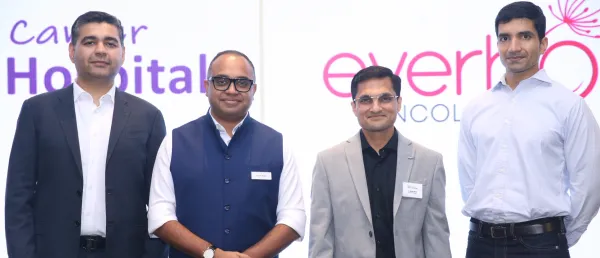IIT Kanpur Develops Indigenous Handheld X-Ray for TB Screening

The device aims to improve early detection and enhance treatment efforts, said ICMR Director General Rajiv Bahl at a recent event.
India has introduced a new handheld X-ray device for tuberculosis (TB) screening, which was developed in partnership between IIT Kanpur and the Indian Council of Medical Research (ICMR).
The device aims to improve early detection and enhance treatment efforts, said ICMR Director General Rajiv Bahl at a recent event.
Reportedly, the new handheld X-ray is expected to cost less than half of its imported counterparts.
"This indigenous device will allow TB screening near patients' homes and reach vulnerable populations more effectively," Dr Bahl added.
Further, speaking at the event, Dr Bahl also mentioned the development of three indigenous testing kits for Mpox. These kits, now being manufactured by three companies, aim to improve diagnostic capabilities across India.
He continued to highlight the efforts against sickle cell disease, noting that over one million people in India are affected by it.
"We have developed 18 low-cost tests for sickle cell anaemia, each costing ₹30 compared to the previous ₹400 per test," he said.
These collaborative efforts align with India's National Sickle Cell Anaemia Elimination Mission, launched by PM Narendra Modi, with a goal of eliminating the disease as a public health issue by 2047.
He further noted that India is progressing towards developing a dengue vaccine, with phase three clinical trials currently underway. If found safe and effective, the vaccine could be launched within a year.
In 2022, ICMR provided INR 4.60 Cr in funding to scientists at IIT Kanpur for the development of the AI-enabled, battery-operated handheld X-ray device.
Moreover, designed for easy transport, the device can be packed into backpacks, allowing for healthcare delivery to remote areas.
Addressing India's TB Crisis
As per data, TB remains a significant health challenge in India, claiming an estimated 480,000 lives annually, which equates to over 1,400 patients every day.
Additionally, the country has more than a million 'missing' TB cases each year that go unnotified. Many of these cases are either undiagnosed or inadequately diagnosed and treated in the private sector.
A senior Health Ministry official earlier pointed out that India's goal to achieve a rapid decline in TB morbidity and mortality and to eliminate TB by 2025 has plateaued.
To reboot the TB-free initiative with zero deaths, disease, and poverty resulting from TB, there is a move to rework the protocol, specifically focusing on TB medication and its duration.
Stay tuned for more such updates on Digital Health News.
Stay tuned for more such updates on Digital Health News





























